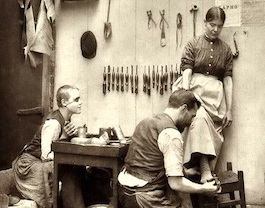To Be or Not To Be, a Craftsman
- JOHN A. CUDDEBACK
"And aren't the respective crafts by nature set over them to seek and provide what is to their advantage?" - Socrates, Plato's Republic
 Rereading the first book of the Republic, I was struck by a bolt of lightning. Plato saw the root question of human life.
Rereading the first book of the Republic, I was struck by a bolt of lightning. Plato saw the root question of human life.
To be or not to be a craftsman. That is the question for every human person. I think I'm finally beginning to see it.
One of the notable aspects of the Republic is that Socrates suggests that justice — the main virtue of human living — is itself a kind of craft [in Greek techne]. Socrates sees a craft as a steady, rational practice of taking care of something.
Socrates main foil is the sophist Thrasymachus. Thrasymachus too thinks that justice is a craft. But for him it is the craft of the strong man looking out for himself. Famously, he argues that justice is 'the advantage of the stronger.' That is, justice is how a strong man seeks his own private advantage. Surely, Thrasymachus has followers down through the ages.
Socrates's response? Thrasymachus does not see what a craft really is. He is an anti-craftsman in the guise of a craftsman.
A true craftsman knows he has been entrusted with something to do. For others. There is something to get done, something bigger than him, something that requires his care-full, rational attention to get it done right. There are certain ways of achieving certain ends, which he must learn and conform himself to. He must look to the good of his work and those for whom he works. If he is to be a craftsman.
This is at the heart of the human: rational practice in service of amazingly great goods. In service of what is beautiful. How to do these practices has been discovered and passed down over countless generations, by the masters, by the wise. Such is the case from end to end of human life: in crafting things in wood, stone, or other material; in crafting the flourishing of earth, plants, and animals; and in crafting human life itself.
Justice. The moral virtue. The craft of rendering what I owe to others, of rendering a debt the very paying of which is my identity and my glory.
In one of the most telling of all Platonic passages, Socrates reflects on the human difference. What sets human life apart? The very first in his list of what is unique to the human soul is 'taking care of things.'
The craftsman is always a person who 'takes care of things!' Artfully. Rationally. Lovingly. It's in his eyes. You can feel it in his hands. And you can see it in what he crafts.
This is for all of us. A gift to be received and to be passed on.
 This is J. Fraser Field, Founder of CERC. I hope you appreciated this piece. We curate these articles especially for believers like you.
This is J. Fraser Field, Founder of CERC. I hope you appreciated this piece. We curate these articles especially for believers like you.
Please show your appreciation by making a $3 donation. CERC is entirely reader supported.

Acknowledgement
 John A. Cuddeback. "To Be or Not To Be, a Craftsman." LifeCraft (March 24, 2021).
John A. Cuddeback. "To Be or Not To Be, a Craftsman." LifeCraft (March 24, 2021).
Reprinted with permission from the author, John A. Cuddeback.


